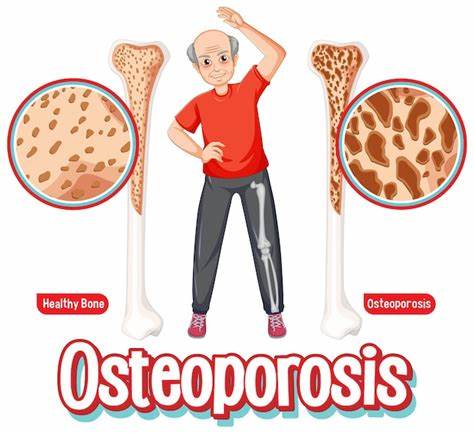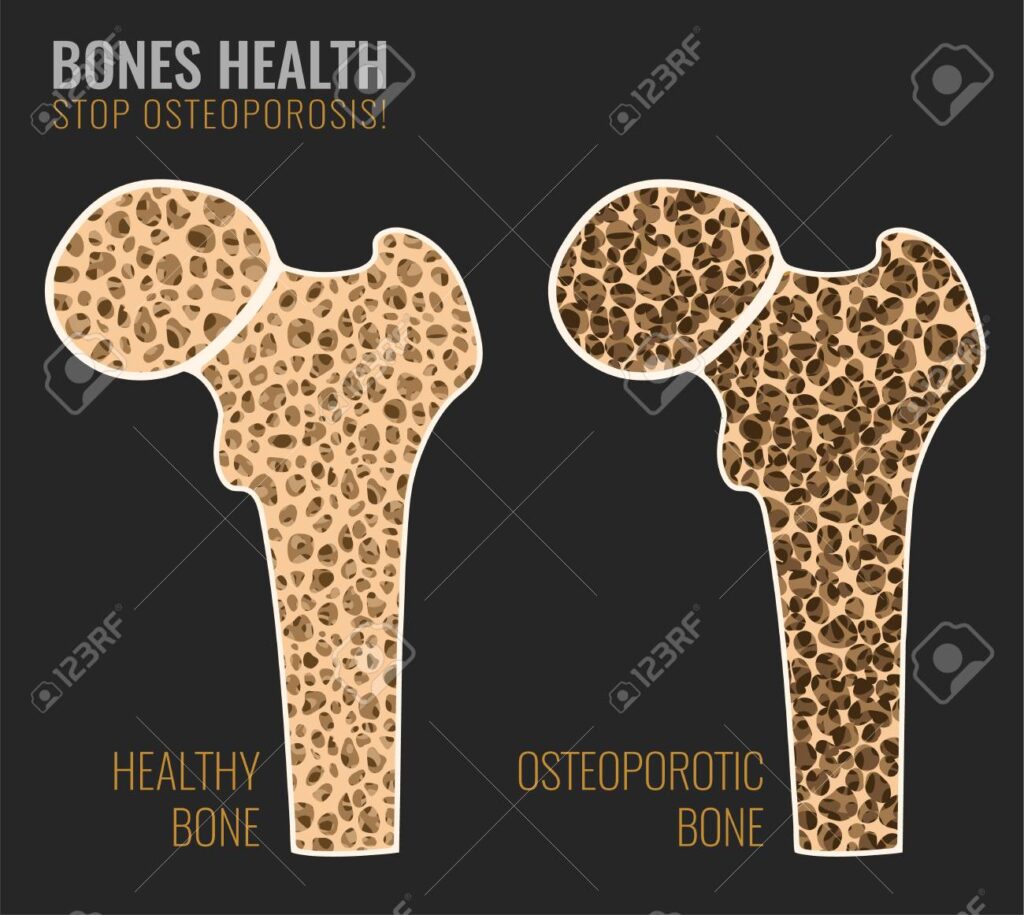
Phosphorus Strengthens Your Bones. In the United States, about 1 in 10 people age 50 years and older have osteoporosis. And also approximately 5.2% of the UK population have it. In addition, 32 million individuals age 50+ are estimated to have osteoporosis, equivalent to 5.6% of the total European population age +50, or approximately 25.5 million women (22.1% of women aged +50) and 6.5 million men (6.6% of men aged +50) Consequently, people with osteoporosis have weak bones, putting them at higher risk for fractures that can lead to serious health problems and death. Thus, causing more than half a million new fragility fractures annually in the UK, there is an enormous treatment gap that leaves approximately 66% of women at high risk of fragility fractures.
What causes osteoporosis to develop in your bones?

Phosphorus Strengthens Your Bones. Simply put, osteoporosis develops when bones break down faster than they grow. There are three types of cells in our bones: those that are responsible for forming bones, those responsible for breaking down bones, and those that help the other two types of cells and other cells throughout the body talk to each other.
In childhood, the cells that form bone, grow faster than the cells that break down bone. But after 50+ and menopause (either surgical or natural), the cells that break down bone, grow faster than the cells that form bone.
Why is osteoporosis more common in women?

Phosphorus Strengthens Your Bones. Osteoporosis is more common in women because of the role estrogen plays in bone health. Estrogen tells the bone formation cells to form new bones. Once we lose estrogen during menopause, these cells no longer get these signals, and no new bone forms. Since bone continues to break down as always, your bone density decreases.
Does Phosphorus Strengthen Your Bones?

Phosphorus Strengthens Your Bones. Yes!!!. Phosphorus is an essential mineral that is found in many foods and dietary supplements. It is the second most abundant mineral in the human body and is found in every cell. So then, phosphorus has many important roles in the body, especially in the bones and teeth. But, it also participates in gene regulation, pH balance, and the formation of DNA (deoxyribonucleic acid), RNA (ribonucleic acid), and ATP (adenosine triphosphate). And which is the main energy source for cells.
Phosphorylation occurs when a phosphate group (made up of phosphorus and oxygen atoms) is attached to a molecule, such as a glucose or protein molecule. Phosphorylation is a vital part of many cellular reactions in the body. Subsequently, this post covers phosphorus and includes recommended intake, food sources, health benefits, deficiency, and safety.
What Is Phosphorus?

Phosphorus Strengthens Your Bones. Phosphorus is one of the most abundant minerals in your body. It is mostly found in your bones and teeth but is also present in every cell in your body. Furthermore, phosphorus and calcium (another essential mineral) combine to make hydroxyapatite, which is the main structural element of bones as well as tooth enamel. Also, along with the kidneys, hormones help keep phosphorus in balance in your bones, teeth, and throughout your body.
So, yes, phosphorous does help strengthen your bones. Aside from bone and tooth formation and health, phosphorus is necessary for several other important functions. Here, the mineral is a key component of cell membranes, which helps cells maintain their structure so they can function properly. In addition, phosphorus helps your body use carbohydrates and fat for fuel. But it also has a role in making proteins as well as kidney function, muscle contractions, normal heart rhythm, and nerve signaling.
Thus, ATP, a key energy source, requires phosphorus as well. However, all living organisms need ATP for normal metabolism. But phosphorus is also an electrolyte that helps your body maintain pH balance. In addition, along with other electrolytes, phosphorus controls fluid and electrolyte losses in your body.
How Much Phosphorus Do You Need per Day?

Phosphorus Strengthens Your Bones. Because phosphorus is an essential mineral, you must consume it regularly via certain foods or dietary supplements. So then, you need phosphorus in varying amounts throughout your life. Therefore, the recommended daily intakes for phosphorus are as follows: All Adults 19 years and older: 700 milligrams (mg)
What Foods Are High in Phosphorus?
Phosphorus Strengthens Your Bones. Phosphorus is found in various types of foods, making it fairly easy to get plenty through a balanced diet. Generally, both plant-based and animal-based foods contain phosphorus. Thus, dairy and grains are the most common sources of phosphorus in the U.S. Here, phosphorus is also found in meats, fish, eggs, nuts, legumes, and certain vegetables.
Some of the top natural sources of phosphorus are:
- Yogurt
- Cow’s milk
- Salmon
- Cheese
- Chicken breast
- Lentils
- Cashew nuts
- Potatoes
- Kidney beans
- Brown rice
- Peas
- Oatmeal
- Eggs
- Tortillas
- Whole wheat bread
Phosphorus is also present in many processed foods, like fast food, frozen meals, soda, and packaged snacks. It may be in various forms, such as dicalcium phosphate, phosphoric acid, disodium phosphate, or sodium tripolyphosphate.
Health Benefits of Phosphorus

Phosphorus Strengthens Your Bones. Supplement use should be individualized and vetted by a healthcare professional, such as a registered dietitian nutritionist (RD or RDN), pharmacist, or healthcare provider. No supplement is intended to treat, cure, or prevent disease.
Phosphorus has numerous roles in the body, all of which are vital to your health.
Some of these roles include:
- Maintaining tooth enamel
- Helping the kidneys filter waste
- Producing DNA and RNA
- Building cell membranes
- Activating enzymes
- Maintaining pH balance
- Regulating gene transcription
Other important functions of phosphorus are discussed below.
Osteoporosis Prevention

Phosphorus Strengthens Your Bones. Phosphorus and calcium are the two most important minerals to bone health. Together, they aid in bone development and mineralization and also increase bone density and strength.
Phosphorus remains vital to your bones throughout your life. Later in life, phosphorus may help prevent osteoporosis, a condition in which bone mineral density decreases, leading to an increased risk of bone fractures and other issues.
Research shows that adequate intake of both phosphorus and calcium is associated with improved bone health and a reduced risk of osteoporosis.
Energy Production
Phosphorus Strengthens Your Bones. Phosphorus is a key component and ATP and, thus, energy production. In particular, ATP contains three phosphate molecules. Hence, the three phosphates are attached to ATP by strong chemical bonds. And when broken, these bonds provide energy.
Cells in your body need energy to perform their jobs. Here, ATP is formed when cells need energy. As an example, when this happens, ATP releases phosphates to the cells, providing instant energy. Consequently. cells use ATP for metabolism, transportation, and mechanical functions, like moving muscles. As a result all cells require ATP.
Muscle and Nerve Function
Phosphorus Strengthens Your Bones. Among its many roles, phosphorus is necessary for muscle contractions and nerve signaling. Therefore, phosphorus is important for both skeletal and cardiac (heart) muscle function. But a lack of phosphorus (hypophosphatemia) has been found to lead to both skeletal and cardiac muscle disorders. Besides, this is thought to be due to a lack of ATP.
Interestingly, too much phosphorus in your blood (hyperphosphatemia) may also disrupt muscle function, cause muscle weakness, and increase the risk of heart disease. Subsequently, research and understanding of the role of phosphorus in the nervous system is limited. However, research suggests that either too much or too little phosphorus may cause certain nervous system disorders.
For example, in one study, a relationship between too much or too little dietary phosphorus was linked to an increased risk of peripheral neuropathy, a disease that affects nerves throughout the body. In this case, according to the study, a phosphorus imbalance may cause inflammation, weakening cell membranes’ structure, or decreased ATP synthesis, all of which may cause improper nerve functioning.
Phosphorus Deficiency
Phosphorus Strengthens Your Bones. Because phosphorus is so widespread in foods, a deficiency is rare. However, phosphorus deficiency is possible.
A phosphorus deficiency isn’t usually the result of a diet low in phosphorus-rich foods. For instance, phosphorus deficiency is most commonly caused by certain medical conditions, like kidney defects, hyperparathyroidism, and diabetic ketoacidosis.
Symptoms of a phosphorus deficiency include:
- Low appetite
- Anemia
- Muscle weakness
- Poor coordination
- Bone pain
- Bone deformities
- Burning or prickling sensations in the skin
- Confusion
- Increased risk of infection
If you suspect a phosphorus deficiency, talk with a healthcare provider to learn about treatment.
Safety

Phosphorus Strengthens Your Bones. If a healthcare provider has recommended phosphorus supplements to you, your awareness of safety considerations is extremely important.
Subsequently, in very rare cases, allergic reactions have been reported as a result of taking phosphorus supplements or medications containing phosphorus. But you should avoid phosphorus supplements if you are allergic to any of their ingredients. Therefore, seek immediate medical attention if you have signs of a severe allergic reaction such as itching, hives, or shortness of breath.
Unfortunately, in the United States, the Food and Drug Administration (FDA) does not regulate supplements like prescription drugs. By the way, this means some supplement products may not contain what the label says. Above all, when choosing a supplement, look for third-party tested products and consult a healthcare provider, registered dietitian nutritionist (RDN or RD), or pharmacist.
Precautions

Phosphorus Strengthens Your Bones. Additional precautions should be taken when using phosphorus. It’s possible to consume too much phosphorus. Excessive phosphorus intake may lead to side effects and other issues in some cases.
High levels of phosphorus in the blood (hyperphosphatemia) may be caused by various medical conditions as well as excessive intake. Too much phosphorus may cause calcium to be removed from bones and other areas and then deposited into soft tissues (a process known as calcification). However, this side effect is mostly seen in people with chronic kidney disease (CKD).
High phosphorus levels may also cause weak bones, muscle cramps, brittle nails, dry skin, irritability, and abnormal heart rhythms (arrhythmia). Consequently, people with certain health conditions may need to monitor their phosphorus intake. A healthcare provider or registered dietitian nutritionist can help you do this.
Recommendation
It’s recommended that you monitor your intake and get regular medical follow-ups for the following conditions that may be affected by phosphorus:
- Kidney disease. The kidneys filter out extra phosphorus to help maintain a proper balance of minerals. However, if you have kidney disease, then your kidneys can’t remove phosphorus as well as they should. Diet changes and dialysis are typically recommended to keep phosphorus levels at bay in people with kidney disease.
- Diabetes. There is some evidence that a diet high in phosphorus may increase the risk of diabetes. This may be because phosphorus is involved in glucose (sugar) metabolism, which is directly linked to diabetes. A low-phosphorus diet may help manage diabetes, but more research is necessary.
- Calcium-phosphorus imbalance. Maintaining balanced levels of both phosphorus and calcium is essential to your health. Certain disorders may lead to imbalances because many hormones and other substances are involved in calcium-phosphorus balance. High phosphorus levels can cause calcium to deposit into soft tissues, leading to an increased risk of bone deformities.
- Hyperparathyroidism. People with hyperparathyroidism have an overactive parathyroid gland that secretes too much parathyroid hormone into the bloodstream. Phosphorus increases the release of parathyroid hormone. This means that excessive phosphorus intake may make hyperparathyroidism worse.
- Cardiovascular disease. High phosphorus levels are associated with an increased risk of hypertension (high blood pressure), atherosclerosis, and vascular calcification. These and other factors may also increase the risk of cardiovascular (heart) disease.
Other precautions may be necessary. Always talk with a healthcare provider before taking phosphorus or other supplements.
Interactions

Phosphorus Strengthens Your Bones. Phosphorus may negatively interact with certain medications or other supplements. These interactions may cause medications or supplements not to work properly.
Interactions may exist between phosphorus and:
- Antacids: Certain types and brands of antacids (used for indigestion and heartburn) may reduce the amount of phosphorus your body absorbs. Antacids that contain aluminum hydroxide or calcium carbonate (including Rolaids and Tums) may interact with phosphorus in this way.
- Laxatives: Laxatives that contain sodium phosphate may increase phosphorus levels. Therefore, taking these types of laxatives only as directed is important. People with kidney disease or heart disease should talk with a healthcare provider before taking sodium phosphate laxatives.
- Corticosteroids: Some evidence suggests a potential interaction between phosphorus and corticosteroids, such as prednisone and dexamethasone. In lab research, these steroids have increased phosphorus excretion through the urine, which may decrease phosphorus levels. More research is necessary, however.
- Diuretics: Diuretics may increase phosphorus concentrations in the bloodstream in people with kidney disease. They may also interfere with how phosphorus is excreted by the kidneys.
- Insulin: High doses of insulin may reduce phosphorus levels. This is because insulin induces phosphorus uptake in cells.
- Phosphate binders: People with kidney disease often take phosphate binders to remove excess phosphorus that the kidneys may not have cleared properly. However, if phosphate binders are taken incorrectly, then they may cause phosphorus levels to become too low.
- Calcium supplements: The metabolism of calcium and phosphorus are closely related. When the intake of one of these minerals is too high, the other may decrease.
- If you use these or other medications or supplements, talk with a healthcare provider about possible interactions with phosphorus.
DONATE
Pensioner Fitness Awards
THE BUSINESS CONCEPT, BEST IN BUSINESS AWARDS
- “MOST INSPIRING SENIOR WELLNESS WEBSITE 2023“
THE GLOBAL HEALTH AND PHARMA, FITNESS AND NUTRITION AWARDS
2. “BEST SENIOR FITNESS AND NUTRITION SPECIALIST 2023“
THE MIDDLE EAST AND AFRICA BUSINESS AWARDS
3. “ MOST INCLUSIVE FITNESS PROVIDER 2023″
THE CORPORATE LIVE WIRE GLOBAL AWARDS 2023/2024
4. ” FITNESS ADVISORY PLATFORM OF THE YEAR“ 2023/2024
In Conclusion
Phosphorus is an essential mineral that you need to get from your diet. Consequently, it performs many important roles in your body, including ATP production, metabolism, bone health, pH balance, and DNA and RNA synthesis. However, phosphorus is found in many foods, making deficiency a rare occurrence, especially in the U.S. But Some people may need to avoid phosphorus supplements or medications due to certain medical conditions or other medications they take. So then, talk with a healthcare provider to learn more about phosphorus.
Important Note *
Remember that everyone is different, it is ultimately YOUR RESPONSIBILITY to find what your body responds to. So please do your due diligence before trying anything new, including getting Medical Advice to ensure your safety and peace of mind.
Connect with me and leave a comment




2 replies on “Phosphorus Strengthens Your Bones”
Dear Allan,
you’re our hero. God bless yo.
Hi Sarah, Thank you for your bkind words, All the best Ian